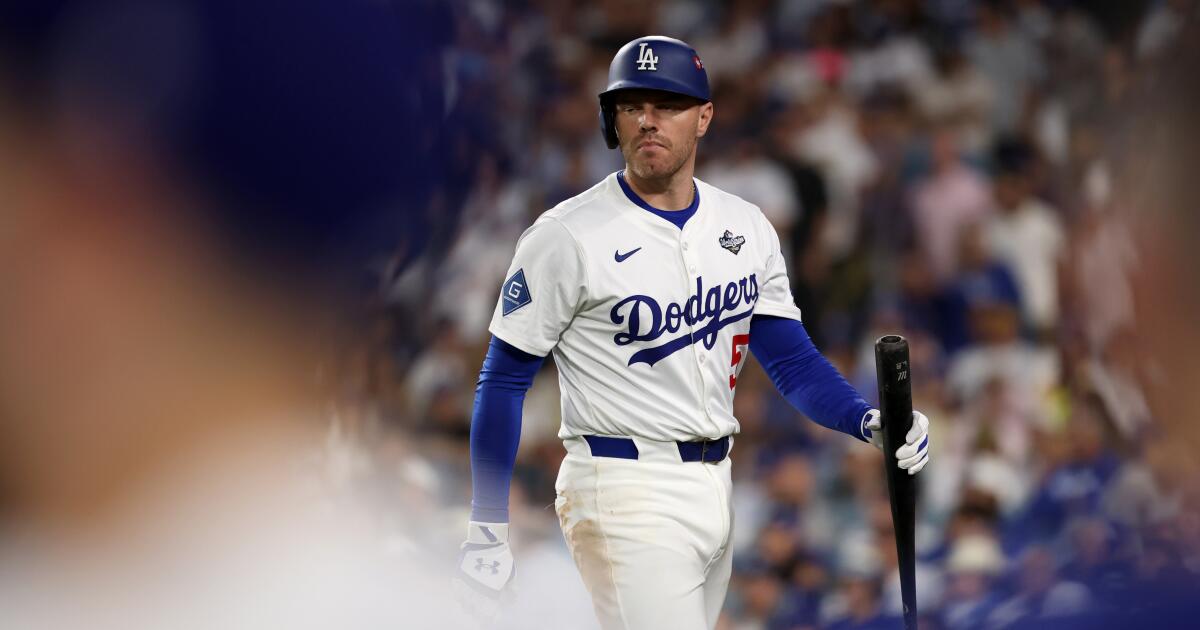
Dodgers in a World Series tailspin after Game 5 loss to Blue Jays
Dodger Stadium wasn’t so much cheering in the seventh inning Wednesday night, as it was pleading with its team’s maddening offense.
All month, the club’s lineup has looked off. All night in Game 5 of the World Series, it had been shut down by Toronto Blue Jays rookie phenom Trey Yesavage.
But, now, in the bottom of the seventh inning, one last moment of hope arose.
Teoscar Hernández had hit an infield single. The Dodgers, down four runs, had a chance to chip away. As Tommy Edman came to the plate, a capacity crowd in Chavez Ravine rose to its feet in desperate anticipation.
Seven pitches and one inning-ending double-play later, they would be quiet again — and, this time, for good.
In a 6-1 loss to the Blue Jays that gave Toronto a 3-2 lead in the series, the Dodgers showed a deflating, disconnected and yet all too familiar identity at the plate.
They struck out 12 times over seven dazzling innings from Yesavage. They looked passive, uncertain and unable to adjust to his admittedly wicked three-pitch repertoire.
It was all the worst traits the Dodgers had flashed at times during their up-and-down regular season, once again rearing their ugly head at precisely the wrong time.
“Right now, we’re at elimination,” manager Dave Roberts said. “We’ve got to kind of wipe the slate clean.”
Earlier this October, it appeared the Dodgers had.
They rolled into the World Series by winning nine of their first 10 postseason games. They were coupling historic starting pitching with opportunistic offense and just enough production from the bullpen. They were seen as heavy Fall Classic favorites against the Blue Jays. Their epic 18-inning win Monday had given them control of the series.
But after scoring just four runs in their last 29 innings, the Dodgers’ once-overlooked offensive problems have escalated into full-scale alarms.
The pressure reached a tipping point even before Wednesday’s first pitch, when the Dodgers announced a Game 5 lineup with several notable alterations.
Slumping shortstop Mookie Betts was dropped from the two-hole down to third, with Will Smith moving up to hit behind Shohei Ohtani. Andy Pages was also relegated to the bench after struggling mightily as the team’s No. 9 hitter. The more contact-minded Alex Call was drawn in to replace him. The hope was that the new-look lineup could be coupled with a refined offensive approach.

“We have faced so much adversity throughout the course of this year that we’re ready for it,” first baseman Freddie Freeman said before the game, comparing the Dodgers’ recent offensive struggles to those they fought through during the second half of the regular season. “Hopefully, as an offense, we can bounce back and put up better at-bats and get going. Because that’s who we are.”
In hindsight, however, exactly “who the Dodgers are” is a question even they don’t seem to know how to answer.
In yet another game, they appeared to be “in-between” in their offensive approach.
At times, they seem to want to slug the ball with big swings and an aggressive plan of attack. At others, they seem preoccupied with protecting against breaking pitches and expanding out of the zone.
The result has been largely impotent production in this World Series, in which they are batting .201 as a team, and a particularly brutal couple nights in Games 4 and 5, in which they went a combined 10 for 61 at the plate and 0 for 6 with runners in scoring position.
“We’re going through one of those funks as an offense,” Kiké Hernández said. “It’s unfortunate timing, coming in the World Series.”
Wednesday’s game, of course, went off the rails before the Dodgers even came to bat.
Dodgers pitcher Blake Snell delivers in the first inning of a 6-1 loss to the Toronto Blue Jays in Game 5 of the World Series at Dodger Stadium on Wednesday night.
(Robert Gauthier / Los Angeles Times)
Three pitches into the top of the first, staff ace Blake Snell had given up two home runs on a pair of fastballs — the first time in World Series history a team led a game off with back-to-back long balls.
That sequence epitomized the Blue Jays’ ability to form an approach and hone an identity. Already an aggressive offense by nature, they guessed that, after Snell struggled to command his fastball in a choppy Game 1 start, he would try to establish it early in the zone. Davis Schneider and Vladimir Guerrero Jr. took advantage with deep shots to left.
“That was kind of the plan,” Blue Jays manager John Schneider said. “That was the approach going in, to be ready to hit.”
From there, the Blue Jays let Yesavage take care of the rest.
In their second game this series against Yesavage — and his MLB-high seven-foot-tall release point — the Dodgers’ game plan was to try to be patient and wait the 22-year-old rookie out. They figured Yesavage would try to get chase with his splitter below the knees. They emphasized the need to lay off the low stuff, force Yesavage to throw up in the zone, then attack any mistakes he left in the wrong spot.
“Just get the ball up and stay off the bottom of the zone,” Freeman said before the game. “Hopefully put good at-bats together and score some runs.”
Toronto Blue Jays pitcher Trey Yesavage reacts after striking out the Dodgers’ Alex Call to end the fifth inning.
(Robert Gauthier / Los Angeles Times)
Yesavage, however, turned the Dodgers’ patience against them. He landed his late-breaking splitter in the zone early in counts, flashing much better feel for his signature pitch than he had in Game 1, when he threw it only 10 times. That helped keep the Dodgers on the back foot, giving them few opportunities to take aggressive, confident swings.
Of the 104 pitches he threw, only three (three!) came in hitters’ counts of 2-and-0, 2-and-1, 3-and-0 or 3-and-1.
“He just kept the ball down, and was throwing strikes,” said third baseman Max Muncy, one of six Dodgers to go hitless Wednesday and one of seven regulars in this series to be batting below .250. “It’s tough to battle against that.”
Especially when the talented 2024 first-round draft pick was executing his late-biting splitter (which, from his high release point, seemingly falls from the sky) and uniquely tailing slider (which, unlike virtually every other variation of the pitch, couples sharp downward movement with late break to his arm side, not glove side).
“His slider was his difference-maker,” Hernández said. “Out of the hand, it looks like a pitch up in the zone. And it just dies.”
Between the splitter and slider, Yesavage got 21 whiffs on 39 swings. Overall, he recorded 12 strikeouts (breaking Don Newcombe’s record for a rookie pitcher in the World Series) and limited the Dodgers to three hits: Two infield singles from Teoscar Hernández (both of which were followed by inning-ending outs from Edman), and a third-inning home run from Kiké Hernández on a rare hitters’ count fastball.
Betts went hitless again, and was short on answers in his postgame media scrum. Ohtani also took an 0-fer that included a swinging strikeout that had him flailing on one knee.
On the whole Wednesday night, the Dodgers took just one at-bat with a runner in scoring position.
“We obviously had some bad at-bats and we didn’t do our best,” Muncy said. “But at the same time, he did a really incredible job.”
Part of that is the reality of facing quality postseason pitching.
But the Dodgers’ inability to adapt their plan of attack midgame was also sorely lacking.
“You still have to use the whole field and take what they give you,” Roberts said. “And if they’re not going to allow for slug, then you’ve got to be able to kind of redirect and club down to take competitive at-bats.”

The Dodgers had other headaches to deal with, as poor defense and relief pitching further compounded their problems.
Although Snell settled down after the home runs, his infield twice failed to turn early double-play balls behind him, resulting in extra throws that drove up his pitch count. Then, in the fourth, Teoscar Hernández came up empty on an over-aggressive and ill-advised sliding attempt on a Daulton Varsho liner down the right-field line, turning a single into a triple that set up a sacrifice fly — and immediately negated the home run Kiké Hernández had hit the half-inning prior.
The fatal blow came in the seventh, when Snell (unable to go any further with his pitch count at 116) turned a two-on, two-out jam over to reliever Edgardo Henriquez, who promptly let both inherited runners score.
Anthony Banda would yield another score in the eighth, adding insult to injury.
But by then, the offensive frustrations had long boiled over. The Dodgers couldn’t adjust, and now their season is on the brink.
First Appeared on
Source link






